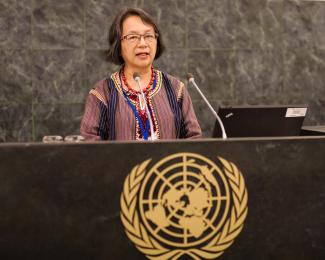
Victoria Tauli-Corpuz (Igorot), UN Special Rapporteur on the Rights of Indigenous Peoples
Traditional knowledge has guided Indigenous people through time, and many of these knowledge systems exist into the present. These knowledge systems are vital in ensuring that Indigenous Peoples are able to maintain their own ecosystems and continue to benefit from them. Traditional knowledge is also very much rooted in our cultures and identities. Therefore, the translation and revitalization of these knowledge systems are important because this will help fight some of the crises we are facing today, whether climate change or biodiversity erosion.
Eighty percent of the world’s biodiversity are found in Indigenous Peoples’ territories, and the traditional knowledge of Indigenous people in sustaining and sustainably using biodiversity has ensured that this vitality of biodiversity is in their territories. Respect for the rights of Indigenous Peoples’ land and territories, as well as the need to obtain their Free, Prior and Informed Consent before any development is brought to their territories, is crucial in protecting biodiversity that is now in a very serious state of crisis.
There should be a way of monitoring how languages are revitalized and how these are being translated. This can be measured in terms of how these languages are used in the school systems, as well as the publication of materials, such as documents or videos of the languages. This requires government action, but it also requires action from Indigenous Peoples themselves. One year is such a short time; that’s why there is a call for an international decade of Indigenous languages, so that there will be a longer period in which to see how the program is going to be implemented.
Victoria Tauli-Corpuz on Traditional Knowledge
The 18th session of the United Nations Permanent Forum on Indigenous Issues was held from April 22nd to May 3rd 2019. The theme for this year was Traditional Knowledge: Generation, Transmission and Protection.
We got a chance to speak via Skype to the United Nations Special Rapporteur on the Rights of Indigenous Peoples, Victoria Tauli-Corpuz, on the meaning behind this particular theme and why it was chosen.
Photo by Broddi Sigurdarson.

